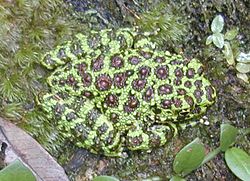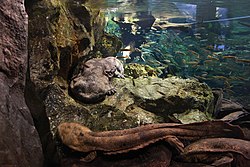List of amphibians of Japan
This list of amphibians recorded in Japan is primarily based on the IUCN Red List, which details the conservation status of some ninety-four species.[1] Of these, four are assessed as critically endangered (the endemic Amakusa salamander, Mikawa salamander, Tosashimizu salamander, and Tsukuba clawed salamander), twenty-seven as endangered, fourteen as vulnerable, eleven as near threatened, and thirty-eight as of least concern.[1]
According to statistics accompanying the 2020 Japanese Ministry of the Environment (MoE) Red List, ninety-one species and subspecies are to be found, but the conservation status of only sixty-seven is detailed.[2][3] Of these, five taxa are critically endangered from a national perspective, twenty are endangered, twenty-two vulnerable, nineteen near threatened, and one data deficient.[2][3]
As of January 2023, for their protection, forty-one species have been designated National Endangered Species by Cabinet Order in accordance with the 1992 Act on Conservation of Endangered Species of Wild Fauna and Flora.[4]







- Family: Bufonidae
- Genus: Bufo
- Asiatic toad, Bufo gargarizans LC IUCN
- Miyako toad, B. g. miyakonis (endemic subspecies) (MoE: NT)
- Japanese common toad, Bufo japonicus LC IUCN (endemic)
- B. j. japonicus
- B. j. formosus
- Japanese stream toad, Bufo torrenticola LC IUCN (endemic)
- Asiatic toad, Bufo gargarizans LC IUCN
- Genus: Rhinella
- Cane toad, Rhinella marina LC IUCN (introduced[5])
- Genus: Bufo
- Family: Dicroglossidae
- Genus: Fejervarya
- Indian rice frog, Fejervarya limnocharis LC IUCN
- Marsh frog, Fejervarya kawamurai LC IUCN
- Sakishima rice frog, Fejervarya sakishimensis LC IUCN
- Genus: Limnonectes
- Namie's frog, Limnonectes namiyei EN IUCN (endemic)
- Genus: Fejervarya
- Family: Hylidae
- Genus: Dryophytes
- Japanese tree frog, Dryophytes japonicus LC IUCN
- Genus: Hyla
- Hallowell's tree frog, Hyla hallowellii LC IUCN (endemic)
- Genus: Dryophytes
- Family: Microhylidae
- Genus: Microhyla
- Okinawa narrow-mouthed toad, Microhyla okinavensis LC IUCN (endemic)
- Yaeyama narrow-mouthed toad, Microhyla kuramotoi LC IUCN (endemic)
- Genus: Microhyla
- Family: Pipidae
- Genus: Xenopus
- African clawed frog, Xenopus laevis LC IUCN (introduced[5])
- Genus: Xenopus
- Family: Ranidae
- Genus: Babina
- Holst's frog, Babina holsti EN IUCN (endemic)
- Otton frog, Babina subaspera EN IUCN (endemic)
- Genus: Glandirana
- Japanese wrinkled frog, Glandirana rugosa LC IUCN (endemic)
- Proto wrinkled frog, Glandirana reliqua (endemic)
- Sado wrinkled frog, Glandirana susurra EN IUCN (endemic)
- Genus: Lithobates
- American bullfrog, Lithobates catesbeianus LC IUCN (introduced[5])
- Genus: Nidirana
- Yaeyama harpist frog, Nidirana okinavana EN IUCN |(endemic)
- Genus: Odorrana
- Amami Ōshima frog, Odorrana splendida EN IUCN (endemic)
- Amami tip-nosed frog, Odorrana amamiensis EN IUCN (endemic)
- Greater tip-nosed frog, Odorrana supranarina EN IUCN (endemic)
- Ishikawa's frog, Odorrana ishikawae EN IUCN (endemic)
- Ryukyu tip-nosed frog, Odorrana narina EN IUCN (endemic)
- Utsunomiya's tip-nosed frog, Odorrana utsunomiyaorum EN IUCN (endemic)
- Genus: Pelophylax
- Black-spotted pond frog, Pelophylax nigromaculatus NT IUCN
- Daruma pond frog, Pelophylax porosus LC IUCN
- Nagoya Daruma pond frog, P. p. brevipodus (endemic subspecies) (MoE: EN)
- Tokyo Daruma pond frog, P. p. porosus (endemic subspecies) (MoE: NT)
- Genus: Rana
- Dwarf Tago's brown frog, Rana kyoto (endemic)
- Dybowski's frog, Rana dybowskii LC IUCN
- Goto Tago's brown frog, Rana matsuoi (endemic)
- Ezo brown frog, Rana pirica LC IUCN
- Japanese brown frog, Rana japonica LC IUCN (endemic)
- Montane brown frog, Rana ornativentris LC IUCN (endemic)
- Neba Tago's brown frog, Rana neba LC IUCN (endemic)
- Oki Tago's brown frog, Rana okiensis (MoE: NT, as R. tagoi okiensis) (endemic)
- Okinawa frog, Rana ulma VU IUCN (endemic)
- Ryukyu brown frog, Rana kobai NT IUCN (endemic)
- Stream brown frog, Rana sakuraii LC IUCN (endemic)
- Tago's brown frog, Rana tagoi LC IUCN (endemic)
- Tsushima brown frog, Rana tsushimensis NT IUCN (endemic)
- Yakushima brown frog, Rana yakushimensis (MoE: NT, as R. tagoi yakushimensis) (endemic)
- Genus: Babina
- Family: Rhacophoridae
- Genus: Buergeria
- Kajika frog, Buergeria buergeri LC IUCN (endemic)
- Ryukyu kajika frog, Buergeria japonica LC IUCN (endemic)
- Yaeyama kajika frog, Buergeria choui LC IUCN
- Genus: Polypedates
- Common tree frog, Polypedates leucomystax LC IUCN (introduced[5])
- Genus: Kurixalus
- Eiffinger's tree frog, Kurixalus eiffingeri LC IUCN
- Genus: Zhangixalus
- Amami green tree frog, Zhangixalus amamiensis LC IUCN (endemic)
- Forest green tree frog, Zhangixalus arboreus LC IUCN (endemic)
- Okinawa green tree frog, Zhangixalus viridis LC IUCN (endemic)
- Owston's green tree frog, Zhangixalus owstoni NT IUCN (endemic)
- Schlegel's green tree frog, Zhangixalus schlegelii LC IUCN (endemic)
- Genus: Buergeria




- Family: Cryptobranchidae
- Genus: Andrias
- Chinese giant salamander Andrias davidianus CR IUCN (introduced[5])
- Japanese giant salamander, Andrias japonicus VU IUCN (endemic)
- Genus: Andrias
- Family: Hynobiidae
- Genus: Hynobius
- Abe's salamander, Hynobius abei EN IUCN (endemic) (MoE: CR)
- Abu salamander, Hynobius abuensis EN IUCN (endemic)
- Aki salamander, Hynobius akiensis EN IUCN (endemic)
- Amakusa salamander, Hynobius amakusaensis CR IUCN (endemic) (MoE: CR)
- Chikushi-buchi salamander, Hynobius oyamai VU IUCN (endemic)
- Chūgoku-buchi salamander, Hynobius sematonotos VU IUCN (endemic)
- Ezo salamander, Hynobius retardatus LC IUCN (endemic) (MoE: DD)
- Geiyo salamander, Hynobius geiyoensis (endemic)
- Blotched salamander, Hynobius naevius EN IUCN (endemic)
- Hakuba salamander, Hynobius hidamontanus EN IUCN (endemic)
- Hida salamander, Hynobius kimurae LC IUCN (endemic)
- Highland salamander, Hynobius utsunomiyaorum VU IUCN (endemic)
- Hokuriku salamander, Hynobius takedai EN IUCN (endemic)
- Hynobius oni (endemic)
- Hynobius tagoi (endemic)
- Ishizuchi salamander, Hynobius hirosei NT IUCN (endemic)
- Iwaki salamander, Hynobius sengokui (endemic)
- Iwami salamander, Hynobius iwami EN IUCN (endemic)
- Iyoshima salamander, Hynobius kuishiensis VU IUCN (endemic)
- Izumo salamander, Hynobius kunibiki (endemic)
- Japanese black salamander, Hynobius nigrescens LC IUCN (endemic)
- Japanese rift salamander, Hynobius fossigenus VU IUCN (endemic)
- Kato's salamander, Hynobius katoi EN IUCN (endemic)
- Mahoroba salamander, Hynobius guttatus NT IUCN (endemic)
- Mikawa salamander, Hynobius mikawaensis CR IUCN (endemic) (MoE: CR)
- Mitsjama salamander, Hynobius nebulosus LC IUCN (endemic)
- Ōdaigahara salamander, Hynobius boulengeri EN IUCN (endemic)
- Ōita salamander, Hynobius dunni VU IUCN (endemic)
- Oki salamander, Hynobius okiensis EN IUCN (endemic)
- Ōsumi salamander, Hynobius osumiensis EN IUCN (endemic)
- San'in salamander, Hynobius setoi EN IUCN (endemic)
- Setouchi salamander, Hynobius setouchi NT IUCN (endemic)
- Smaller blotched salamander, Hynobius stejnegeri NT IUCN (endemic)
- Sobo salamander, Hynobius shinichisatoi EN IUCN (endemic)
- Stejneger's oriental salamander, Hynobius ikioi VU IUCN (endemic)
- Sumida salamander, Hynobius sumidai (endemic)
- Tōhoku salamander, Hynobius lichenatus LC IUCN (endemic)
- Tokyo salamander, Hynobius tokyoensis VU IUCN (endemic)
- Tosashimizu salamander, Hynobius tosashimizuensis CR IUCN (endemic) (MoE: CR)
- Tsurugi salamander, Hynobius tsurugiensis EN IUCN (endemic)
- Tsushima salamander, Hynobius tsuensis NT IUCN (endemic)
- Yamaguchi salamander, Hynobius bakan EN IUCN (endemic)
- Yamato salamander, Hynobius vandenburghi VU IUCN (endemic)
- Genus: Onychodactylus
- Bandai clawed salamander, Onychodactylus intermedius NT IUCN (endemic)
- Fireback clawed salamander, Onychodactylus pyrrhonotus (endemic)
- Japanese clawed salamander, Onychodactylus japonicus LC IUCN (endemic)
- Shikoku clawed salamander, Onychodactylus kinneburi VU IUCN (endemic)
- Tadami clawed salamander, Onychodactylus fuscus EN IUCN (endemic)
- Tōhoku clawed salamander, Onychodactylus nipponoborealis LC IUCN (endemic)
- Tsukuba clawed salamander, Onychodactylus tsukubaensis CR IUCN (endemic) (MoE: CR)
- Genus: Salamandrella
- Siberian salamander, Salamandrella keyserlingii LC IUCN
- Genus: Hynobius
- Family: Salamandridae
- Genus: Cynops
- Japanese fire belly newt, Cynops pyrrhogaster NT IUCN (endemic)
- Sword-tail newt, Cynops ensicauda VU IUCN (endemic)
- C. e. ensicauda
- C. e. popei
- Genus: Echinotriton
- Anderson's crocodile newt, Echinotriton andersoni VU IUCN (endemic)
- Raffaelli's spiny crocodile newt, Echinotriton raffaellii (endemic)
- Genus: Cynops
Japanese names
[edit]The Japanese names for the taxa found in Japan have been collated and published by the Herpetological Society of Japan.[6]
See also
[edit]References
[edit]- ^ a b "IUCN Red List>Advanced Search>Taxonomy: Amphibia - Land Regions: Japan". IUCN. Retrieved 13 October 2023.
- ^ a b 環境省レッドリスト2020掲載種数表 [Ministry of the Environment Red List 2020: Table of Number of Species Listed] (PDF) (in Japanese). Ministry of the Environment. Retrieved 27 July 2021.
- ^ a b 環境省レッドリスト2020 [Ministry of the Environment Red List 2020] (PDF) (in Japanese). Ministry of the Environment. Retrieved 26 July 2021.
- ^ 国内希少野生動植物種一覧 [List of National Endangered Species] (in Japanese). Ministry of the Environment. January 2023. Retrieved 13 October 2023.
- ^ a b c d e "Invasive Species of Japan: Amphibians". National Institute for Environmental Studies. Retrieved 27 July 2021.
- ^ 日本産爬虫両生類標準和名リスト [Standard Japanese Names for the Reptiles and Amphibians of Japan] (in Japanese). Herpetological Society of Japan. 8 September 2023. Retrieved 13 October 2023.
